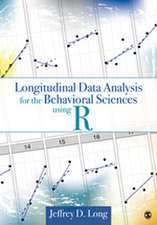The SAGE Handbook of Quantitative Methodology for the Social Sciences
Editat de David W. Kaplanen Limba Engleză Hardback – 16 aug 2004
`The 24 chapters in this Handbook span a wide range of topics, presenting the latest quantitative developments in scaling theory, measurement, categorical data analysis, multilevel models, latent variable models, and foundational issues. Each chapter reviews the historical context for the topic and then describes current work, including illustrative examples where appropriate. The level of presentation throughout the book is detailed enough to convey genuine understanding without overwhelming the reader with technical material. Ample references are given for readers who wish to pursue topics in more detail. The book will appeal to both researchers who wish to update their knowledge of specific quantitative methods, and students who wish to have an integrated survey of state-of- the-art quantitative methods' - Roger E Millsap, Arizona State University
The SAGE Handbook of Quantitative Methodology for the Social Sciences is the definitive reference for teachers, students, and researchers of quantitative methods in the social sciences, as it provides a comprehensive overview of the major techniques used in the field. The contributors, top methodologists and researchers, have written about their areas of expertise in ways that convey the utility of their respective techniques, but, where appropriate, they also offer a fair critique of these techniques. Relevance to real-world problems in the social sciences is an essential ingredient of each chapter and makes this an invaluable resource.
The Handbook is divided into six sections:
• Scaling
• Testing and Measurement
• Models for Categorical Data
• Models for Multilevel Data
• Models for Latent Variables
• Foundational Issues
These sections, comprising twenty-four chapters, address topics in scaling and measurement, advances in statistical modeling methodologies, and broad philosophical themes and foundational issues that transcend many of the quantitative methodologies covered in the book.
The Handbook is indispensable to the teaching, study, and research of quantitative methods and will enable readers to develop a level of understanding of statistical techniques commensurate with the most recent, state-of-the-art, theoretical developments in the field. It provides the foundations for quantitative research, with cutting-edge insights on the effectiveness of each method, depending on the data and distinct research situation.
Preț: 1088.21 lei
Preț vechi: 1490.70 lei
-27% Nou
Puncte Express: 1632
Preț estimativ în valută:
208.23€ • 217.85$ • 172.98£
208.23€ • 217.85$ • 172.98£
Carte tipărită la comandă
Livrare economică 03-17 aprilie
Preluare comenzi: 021 569.72.76
Specificații
ISBN-13: 9780761923596
ISBN-10: 0761923594
Pagini: 528
Ilustrații: Illustrations
Dimensiuni: 178 x 254 x 33 mm
Greutate: 1.1 kg
Ediția:New.
Editura: SAGE Publications
Colecția Sage Publications, Inc
Locul publicării:Thousand Oaks, United States
ISBN-10: 0761923594
Pagini: 528
Ilustrații: Illustrations
Dimensiuni: 178 x 254 x 33 mm
Greutate: 1.1 kg
Ediția:New.
Editura: SAGE Publications
Colecția Sage Publications, Inc
Locul publicării:Thousand Oaks, United States
Recenzii
“The 24 chapters in this Handbook span a wide range of topics, presenting the latest quantitative developments in scaling theory, measurement, categorical data analysis, multilevel models, latent variable models, and foundational issues. Each chapter reviews the historical context for the topic and then describes current work, including illustrative examples where appropriate. The level of presentation throughout the book is detailed enough to convey genuine understanding without overwhelming the reader with technical material. Ample references are given for readers who wish to pursue topics in more detail. The book will appeal to both researchers who wish to update their knowledge of specific quantitative methods, and students who wish to have an integrated survey of state-of- the-art quantitative methods.”
“This handbook discusses important methodological tools and topics in quantitative methodology in easy to understand language. It is an exhaustive review of past and recent advances in each topic combined with a detailed discussion of examples and graphical illustrations. It will be an essential reference for social science researchers as an introduction to methods and quantitative concepts of great use.”
“David Kaplan and SAGE Publications are to be congratulated on the development of a new handbook on quantitative methods for the social sciences. The Handbook is more than a set of methodologies, it is a journey. This methodological journey allows the reader to experience scaling, tests and measurement, and statistical methodologies applied to categorical, multilevel, and latent variables. The journey concludes with a number of philosophical issues of interest to researchers in the social sciences. The new Handbook is a must purchase.”
"David Kaplan has convened a panel of top-notch methodologians, who take on the challenge in the writing of The SAGE Handbook of Quantitative Methodology for the Social Sciences (SHQM). The result is an engrossing collection of chapters that are sure to add screwdrivers, wrenches, and the occasional buzzsaw to your toolbox. A notable strength of the SHQM is the generally structure of each chapter. The chapters of the SHQM are a worthy accomplishment. The SHQM is both well conceived and well executed, providing the reader with numerous insights and a broader sense for the available tools of the quantitative methodological trade. It is most likely that few readers will have the opportunity to read this book from cover to cover, but should they feel so inspired, they will find the effort both rewarding and thought provoking."
"The Handbook provides an excellent introduction to broad range of state-of-the-art quantitative methods applicable to the social sciences. It shows the breadth and depth of advanced quantitative methods used by social scientists from numerous interrelated disciplines, it is rich with examples of real-world applications of these methods, and it provides suggestions for further readings and study in these areas. It is well worth reading cover-to-cover, and it is a very useful addition to the reference libraries of all quantitative social scientists, applied statisticians, and graduate students."
“This handbook discusses important methodological tools and topics in quantitative methodology in easy to understand language. It is an exhaustive review of past and recent advances in each topic combined with a detailed discussion of examples and graphical illustrations. It will be an essential reference for social science researchers as an introduction to methods and quantitative concepts of great use.”
“David Kaplan and SAGE Publications are to be congratulated on the development of a new handbook on quantitative methods for the social sciences. The Handbook is more than a set of methodologies, it is a journey. This methodological journey allows the reader to experience scaling, tests and measurement, and statistical methodologies applied to categorical, multilevel, and latent variables. The journey concludes with a number of philosophical issues of interest to researchers in the social sciences. The new Handbook is a must purchase.”
"David Kaplan has convened a panel of top-notch methodologians, who take on the challenge in the writing of The SAGE Handbook of Quantitative Methodology for the Social Sciences (SHQM). The result is an engrossing collection of chapters that are sure to add screwdrivers, wrenches, and the occasional buzzsaw to your toolbox. A notable strength of the SHQM is the generally structure of each chapter. The chapters of the SHQM are a worthy accomplishment. The SHQM is both well conceived and well executed, providing the reader with numerous insights and a broader sense for the available tools of the quantitative methodological trade. It is most likely that few readers will have the opportunity to read this book from cover to cover, but should they feel so inspired, they will find the effort both rewarding and thought provoking."
"The Handbook provides an excellent introduction to broad range of state-of-the-art quantitative methods applicable to the social sciences. It shows the breadth and depth of advanced quantitative methods used by social scientists from numerous interrelated disciplines, it is rich with examples of real-world applications of these methods, and it provides suggestions for further readings and study in these areas. It is well worth reading cover-to-cover, and it is a very useful addition to the reference libraries of all quantitative social scientists, applied statisticians, and graduate students."
Cuprins
Preface
Acknowledgments
Section I: Scaling
Chapter 1: Dual Scaling - Shizuhiko Nishisato
Chapter 2: Multidimensional Scaling and Unfolding of Symmetric and Asymmetric Proximity Relations - Willem J. Heiser and Frank M.T.A. Busing
Chapter 3: Principal Components Analysis With Nonlinear Optimal Scaling Transformations for Ordinal and Nominal Data - Jacqueline J. Muelman, Anita J. Van der Kooij, and Willem J. Heiser
Section II: Testing and Measurement
Chapter 4: Responsible Modeling of Measurement Data for Appropriate Inferences: Important Advances in Reliability and Validity Theory - Bruno D. Zumbo and Andre A. Rupp
Chapter 5: Test Modeling - Ratna Nandakumar and Terry Ackerman
Chapter 6: Differential Item Functioning Analysis: Detecting DIF Items and Testing DIF Hypotheses - Louis A. Roussos and William Stout
Chapter 7: Understanding Computerized Adaptive Testing: from Robbins-Monro to Lord and Beyond - Hua-Hua Chang
Section III: Models for Categorical Data
Chapter 8: Trends in Categorical Data Analysis: New, Semi-New, and Recycled Ideas - David Rindskopf
Chapter 9: Ordinal Regression Models - Valen E. Johnson and James H. Albert
Chapter 10: Latent Class Models - Jay Magidson and Jeroen K. Vermunt
Chapter 11: Discrete-Time Survival Analysis - John B. Willett and Judith D. Singer
Section IV: Models for Multilevel Data
Chapter 12: An Introduction to Growth Modeling - Donald Hedecker
Chapter 13: Multilevel Models for School Effectiveness Research - Russell W. Rumberger and Gregory J. Palardy
Chapter 14: The Use of Hierarchical Models in Analyzing Data from Experiments and Quasi-Experiments Conducted in Field Settings - Michael Seltzer
Chapter 15: Meta-Analysis - Spyros Konstantopoulos and Larry V. Hedges
Section V: Models for Latent Variables
Chapter 16: Determining the Number of Factors in Exploratory and Confirmatory Factor Analysis - Rick H. Hoyle and Jamieson L. Duvall
Chapter 17: Experimental, Quasi-Experimental, and Nonexperimental Design and Analysis with Latent Variables - Gregory R. Hancock
Chapter 18: Applying Dynamic Factor Analysis in Behavioral and Social Science Research - John R. Nesselroade and Peter C. M. Molenaar
Chapter 19: Latent Variable Analysis: Growth Mixture Modeling and Related Techniques for Longitudinal Data - Bengt Muthen
Section VI: Foundational Issues
Chapter 20: Probabalistic Modeling with Bayesian Networks - Richard E. Neapolitan and Scott Morris
Chapter 21: The Null Ritual: What You Always Wanted to Know About Significance Testing but Were Afraid to Ask - Gerd Gigerenzer, Stefan Krauss, and Oliver Vitouch
Chapter 22: On Exogeneity - David Kaplan
Chapter 23: Objectivity in Science and Structural Equation Modeling - Stanley A. Mulaik
Chapter 24: Causal Inference - Peter Spirtes, Richard Scheines, Clark Glymour, Thomas Richardson, and Christopher Meek
Index
Acknowledgments
Section I: Scaling
Chapter 1: Dual Scaling - Shizuhiko Nishisato
Chapter 2: Multidimensional Scaling and Unfolding of Symmetric and Asymmetric Proximity Relations - Willem J. Heiser and Frank M.T.A. Busing
Chapter 3: Principal Components Analysis With Nonlinear Optimal Scaling Transformations for Ordinal and Nominal Data - Jacqueline J. Muelman, Anita J. Van der Kooij, and Willem J. Heiser
Section II: Testing and Measurement
Chapter 4: Responsible Modeling of Measurement Data for Appropriate Inferences: Important Advances in Reliability and Validity Theory - Bruno D. Zumbo and Andre A. Rupp
Chapter 5: Test Modeling - Ratna Nandakumar and Terry Ackerman
Chapter 6: Differential Item Functioning Analysis: Detecting DIF Items and Testing DIF Hypotheses - Louis A. Roussos and William Stout
Chapter 7: Understanding Computerized Adaptive Testing: from Robbins-Monro to Lord and Beyond - Hua-Hua Chang
Section III: Models for Categorical Data
Chapter 8: Trends in Categorical Data Analysis: New, Semi-New, and Recycled Ideas - David Rindskopf
Chapter 9: Ordinal Regression Models - Valen E. Johnson and James H. Albert
Chapter 10: Latent Class Models - Jay Magidson and Jeroen K. Vermunt
Chapter 11: Discrete-Time Survival Analysis - John B. Willett and Judith D. Singer
Section IV: Models for Multilevel Data
Chapter 12: An Introduction to Growth Modeling - Donald Hedecker
Chapter 13: Multilevel Models for School Effectiveness Research - Russell W. Rumberger and Gregory J. Palardy
Chapter 14: The Use of Hierarchical Models in Analyzing Data from Experiments and Quasi-Experiments Conducted in Field Settings - Michael Seltzer
Chapter 15: Meta-Analysis - Spyros Konstantopoulos and Larry V. Hedges
Section V: Models for Latent Variables
Chapter 16: Determining the Number of Factors in Exploratory and Confirmatory Factor Analysis - Rick H. Hoyle and Jamieson L. Duvall
Chapter 17: Experimental, Quasi-Experimental, and Nonexperimental Design and Analysis with Latent Variables - Gregory R. Hancock
Chapter 18: Applying Dynamic Factor Analysis in Behavioral and Social Science Research - John R. Nesselroade and Peter C. M. Molenaar
Chapter 19: Latent Variable Analysis: Growth Mixture Modeling and Related Techniques for Longitudinal Data - Bengt Muthen
Section VI: Foundational Issues
Chapter 20: Probabalistic Modeling with Bayesian Networks - Richard E. Neapolitan and Scott Morris
Chapter 21: The Null Ritual: What You Always Wanted to Know About Significance Testing but Were Afraid to Ask - Gerd Gigerenzer, Stefan Krauss, and Oliver Vitouch
Chapter 22: On Exogeneity - David Kaplan
Chapter 23: Objectivity in Science and Structural Equation Modeling - Stanley A. Mulaik
Chapter 24: Causal Inference - Peter Spirtes, Richard Scheines, Clark Glymour, Thomas Richardson, and Christopher Meek
Index
Notă biografică
David Kaplan received his Ph.D. in Education from UCLA in 1987. He is now a Professor of Education and (by courtesy) Psychology at the University of Delaware. His research interests are in the development and application of statistical models to problems in educational evaluation and policy analysis. His current program of research concerns the development of dynamic latent continuous and categorical variable models for studying the diffusion of educational innovations. HisWeb site is atwww.udel.edu/dkaplan.
Descriere
Quantitative methodology is a highly specialized field, and as with any highly specialized field, working through idiosyncratic language can be very difficult, made even more so when concepts are conveyed in the language of mathematics and statistics. The SAGE Handbook of Quantitative Methodology for the Social Sciences was conceived as a way of introducing applied statisticians, empirical researchers and graduate students to the broad array of state-of-the-art quantitative methodologies in the social sciences.










